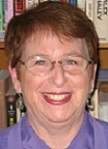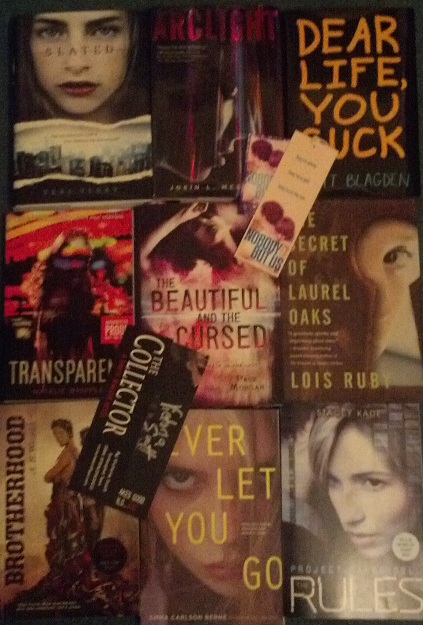What notes have you taken from the publishing industry recently in hopes of reaching a broader audience and/or increasing your longevity as an author?

"You asked this same thing ten questions ago: successful authors diversify. Unless your plan is to write a single massive blockbuster series that never goes out of print and attracts perpetual attention for the rest of your life, you ned to keep writing and innovating and trying new things and testing new markets. Which isn't really a bad thing, because writing is what got you into this business in the first place, right? Turns out you get to do way more of it than you thought, in all kinds of cool little niches and venues and styles. I find it invigorating." - Dan Wells, author of Fragments.

"I’ve actually taken fewer notes than I did when I first started trying to get published. For me, being away from the industry can be extremely rejuvenating. I think that plays a big role in how I write. So many smarter authors than me have said you have to live in order to write, and I’m taking that to heart lately. As far as I’ve seen, it’s excellent advice." - Natalie Whipple, author of Transparent.
"That longevity as an author doesn’t stem from large numbers of friends or followers on online social media sites. It comes from sitting down every day to write, turning projects in to your agent or editor, and never giving up." - Page Morgan, author of The Beautiful and the Cursed.
 "I actually take away notes that might say kind of the opposite. There is no failsafe. There is no magic thing we can do. What may work for one book and one author may not work for me, and in fact everyone in the industry is often guessing as to what will grow an audience and increase a writer’s longevity in this business. I’m not saying I don’t welcome the advice of the professionals. My ears are open, and I listen. But at the end of the day, I do only what feels genuine to me. I write the books I want to write. And we’ll see." - Nova Ren Suma, author of 17 & Gone.
"I actually take away notes that might say kind of the opposite. There is no failsafe. There is no magic thing we can do. What may work for one book and one author may not work for me, and in fact everyone in the industry is often guessing as to what will grow an audience and increase a writer’s longevity in this business. I’m not saying I don’t welcome the advice of the professionals. My ears are open, and I listen. But at the end of the day, I do only what feels genuine to me. I write the books I want to write. And we’ll see." - Nova Ren Suma, author of 17 & Gone.
"To be honest, I don’t tend to look at it in that way. The most important thing is to keep writing as well as I can; the books have to come first. After that, I do as much as I can in terms of events and promotion. So far I’ve been too busy to actually stop and think beyond that!" - Dave Cousins, author of 15 Days Without a Head.

"I'm wondering if I should maybe clean up a little. Less kissing. No swearing... I mean, I guess I'll keep that in mind with the next book. Chances are my characters will still want to make out, though." - Suzanne Young, author of The Program.

"I'm putting my faith in what has kept authors writings stories for centuries--thrilling plots and characters that you can't get out of your head." - Emma Carlson Berne, author of Never You Let Go.

"Recently, there’s a trend in publishing (for YA) that’s come straight out of my former comfort zone (which is fanfiction writing). One shot short stories or novellas from an alternate POV that give readers a glimpse of someone they might not have a clear picture of from the original novel are the sorts of things I used to write for fun all the time. Now I get to do so as part of my job, knowing that the audience usually loves those new perspectives. And that’s the point – sometimes it takes a different angle to make things work." - Josin McQuein, author of Arclight.

"I haven’t thought about either of these things yet. I focus on writing stories I’m interested in and creating characters I’m passionate about. The rest will take care of itself. Who knows, maybe I’ll change my mind if my book doesn’t sell well, but I know I’d have trouble writing a book if my motivation was something other than great story and deep character. One note I have taken from the publishing industry comes from my editor, Adah Nuchi, at Houghton Mifflin Harcourt. When I was stressing about a potential release date for my second book, she told me to ignore theoretical release dates and take as much time as I needed to get the story right. Sound advice, but not easy to swallow for someone as impatient and ambitious as I am." - Scott Blagden, author of Dear Life, You Suck.

"Be consistent. Keep producing. It's a hard business to stay relevant in, but the more quality work I create, the better my chances of survival." - Lindsey Leavitt, author of Going Vintage.

"More formula, less originality. More action, less introspection. More fantasy, less reality. More simplicity, less complexity of character and plot. And we, as authors, have to be brazen hussies to promote our names and books. That is definitely not the fun part!" - Lois Ruby, author of Rebel Spirits.
A new round of Author Insight is coming soon!
WINNER!










































No comments:
Post a Comment